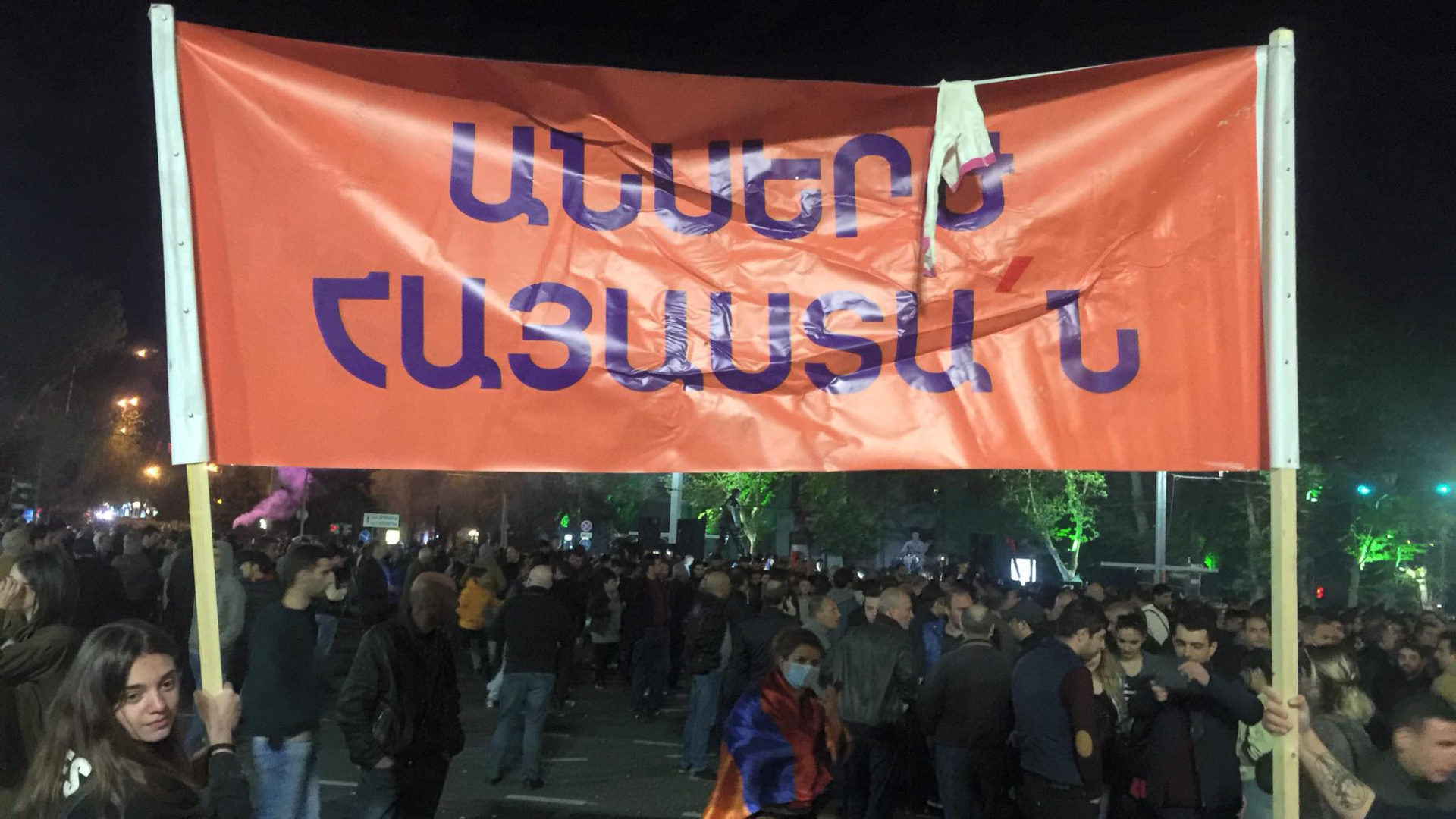“We call on the Armenian authorities to immediately cease all harassment and actions against human rights defenders and journalists carrying out their legitimate work, to release people unlawfully detained, and to refrain from arresting and employing violence against peaceful protesters,” commented Ane Tusvik Bonde, Senior Advisor at Human Rights House Foundation.
Human rights defenders Lara Aharonian and Mamikon Hovsepyan at the protests on 17 April, wearing badges from Front Line Defenders signalling that they are attending the protests to objectively monitor and report on them. Photo: Kolya Hovhannisyan.
Human rights defenders Lara Aharonian and Anna Nikoghosyan were temporarily detained and taken to a police station on 20 April, while they documented and reported on the peaceful protests in Yerevan. Lara Aharonian is the head of Women’s Resource Center of Armenia (WRCA), member NGO of Human Rights House Yerevan.
Also, on 19 April, two persons in civilian clothing attacked journalist Tirayr Muradyan from armrus.info. As reported by the journalist, those beating him were police officers in civilian clothing, who attacked after requesting him not to film. None of the police officers in the vicinity intervened or prevented the attack.
“We remind the Armenian authorities of their obligations to protect human rights defenders and journalists, and to make sure that they are not hindered in their work, as set out in the Declaration on Human Rights Defenders,” says Ane Tusvik Bonde.
Protests began in Yerevan on 13 April, following the nomination of longtime former President Serzh Sargsyan for the post of prime minister, by Armenia’s ruling Republican Party. The protests gained strength on 19 April as the Armenian parliament voted to appoint Sargsyan as prime minister.
As the protests continue, Ingibjörg Sólrún Gísladóttir, Director of the OSCE Office for Democratic Institutions and Human Rights (ODIHR), urged the authorities in Armenia to protect and ensure the right to freedom of peaceful assembly.
“All people have a fundamental right to express their opinion in peaceful protests… Law enforcement authorities must not only refrain from interfering with the right to freedom of peaceful assembly, but have a responsibility to facilitate this right. This includes ensuring the safety and security of participants in the face of any disruptions, such as by agent provocateurs or counter-protestors.”
On 18 April, a group of Armenian NGOs, including several from Human Rights House Yerevan, issued a joint statement on the response by the authorities to the protests.
“Police forcibly and groundlessly subjected peaceful protesters, including minors, to mass detention and are trying to involve them as suspects in the organisation and execution of mass disorders,” reads the joint statement.
The group of NGOs also cautioned that provocateurs had appeared at rallies on 18 April to provoke clashes with peaceful protesters, and warned that “such acts of provocation were aimed at paving the way for the police to carry out criminal prosecution against protesters.”
The NGOs call on the Armenian police to:
- identify persons inciting provocation and violence, ensuring the security of citizens, including peaceful protesters
- cease the criminal and administrative prosecution against peaceful protesters
- exclude any use of violence against peaceful protesters.
They call on the Armenian Special Investigation Service to immediately investigate:
- incidents of violence and other unlawful acts against protesters by police officers (including those in civilian clothing)
- the unlawful holding of peaceful protesters in police stations for longer than the established period of three hours.
Background in Armenia
In December 2015, a referendum passed amendments to the Armenian constitution, making the president a largely ceremonial role while elevating the power of the prime minister. At the time, the ruling Republican Party claimed that this would strengthen democracy by creating a greater balance of powers and a stronger judiciary. However, opposition claimed that this was a thinly veiled attempt to extend President Serzh Sargsyan’s rule, enabling him to seek election as the newly empowered prime minister after his final term as president ends in 2018.
It seems the worries of the opposition have been realised.
In recent years, Armenia has on several occasions experienced mass protests and a violent crackdown on them by authorities.
The largely peaceful “Erebuni” mass protests in the summer of 2016 were met with disproportionate force, detentions, and provocations by law enforcement, leading to violent confrontations between police and protestors. At the time, HRHF warned that “the authorities have failed to meet their obligation to facilitate and support peaceful protests, and in many cases they have undermined efforts to ensure events remained peaceful.”
In June 2015, during the protests of “Electric Yerevan,” representatives of the network of Human Rights House Network documented similar alleged violations of the right to peaceful assembly, including excessive use of force by the police, alleged inhuman treatment, and arbitrary detention.
During the UPR review in 2015, Armenia received multiple recommendations regarding the need to ensure the freedom of assembly of its citizens, including opposition members.
The UN Human Rights Committee, in its concluding observations regarding Armenia in 2012, expressed concern about the lack of accountability of police in the cases of excessive use of force and called on the authorities to train the police forces effectively, to ensure they respect human rights.
In 2011, the UN Working Group on Arbitrary Detention called on Armenian authorities to improve the situation regarding the right to peaceful assembly.






